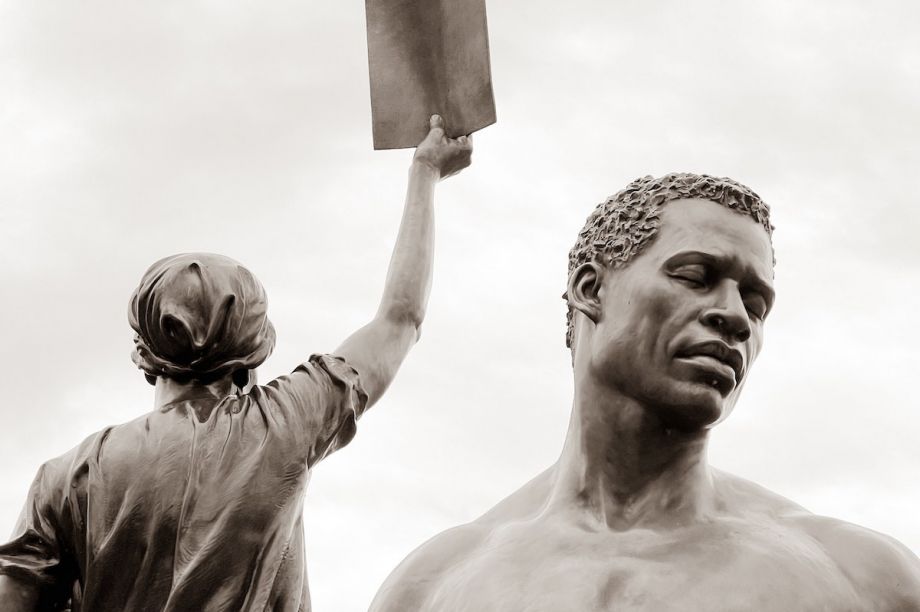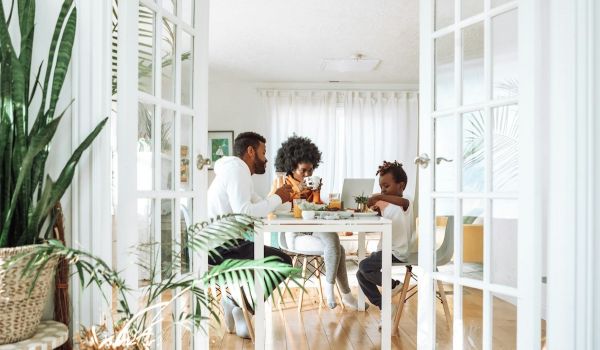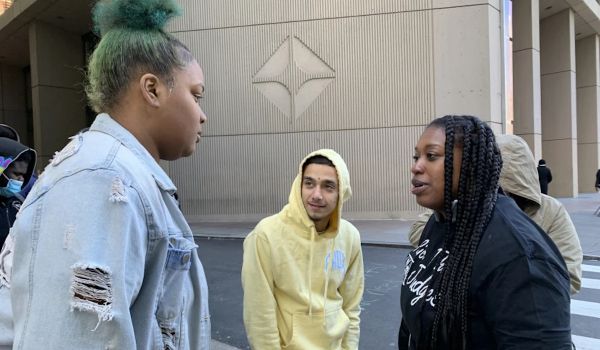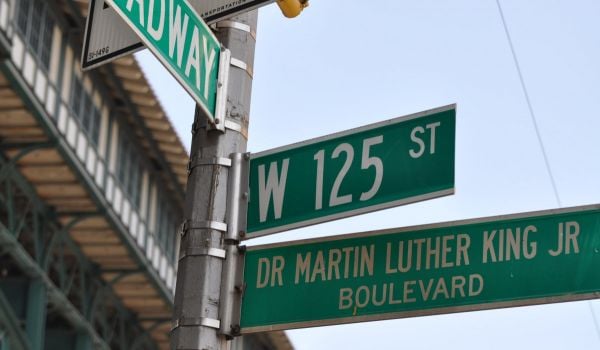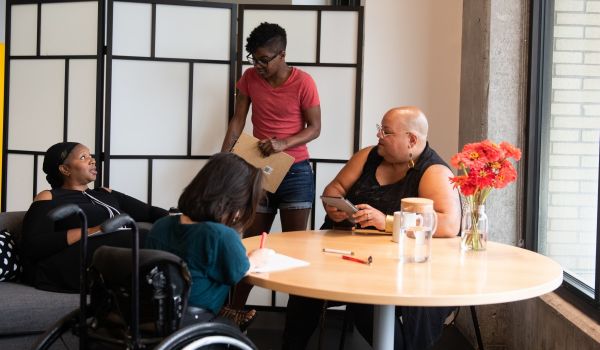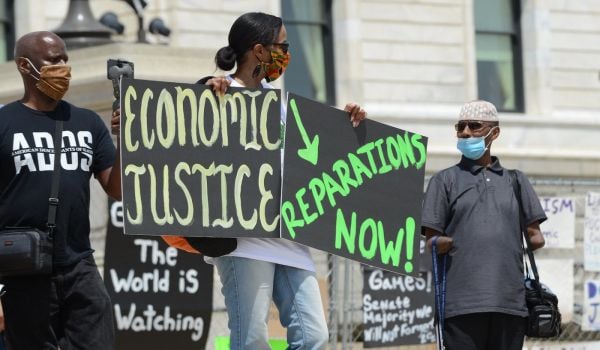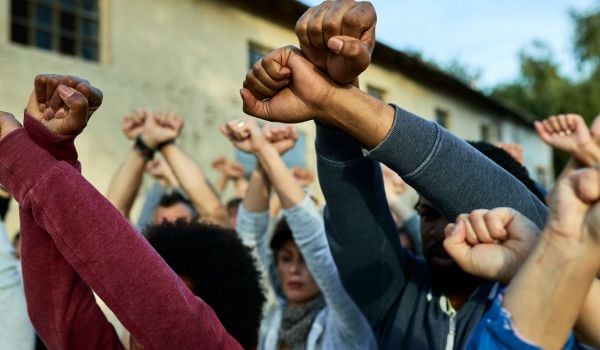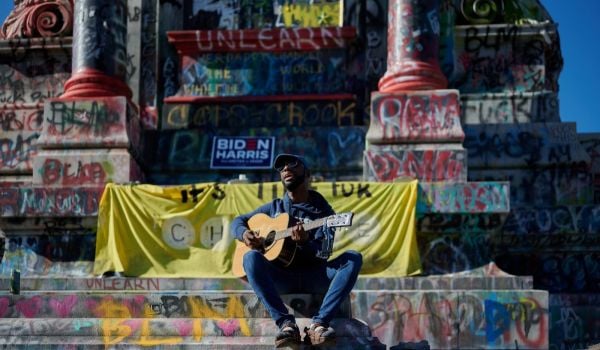This essay is part of the Richmond Racial Equity Essays series exploring what racial equity looks like in Virginia’s capital, where we held our annual Vanguard gathering in September. We will be sharing a few of the 2023 essays with our readers this month; read the rest here.
In December 2022, I took some time off to discern the next steps in my career and found myself at the Door of No Return on Goree Island in Dakar, Senegal.
This island was one of the many places in West Africa where enslaved Africans were held in barracoons before being shipped to the Americas. With ancestry from seven West African countries, a few of my Senegalese ancestors likely walked through these doors. As I stood at the doorway staring out to the vast blue-green ocean, my heart was heavy as I pondered the tragedy of millions of Africans being kidnapped, torn from families and homelands, and packed on ships to spend the rest of their lives enslaved. But oddly enough, I also felt triumphant. I exist because they survived. I had returned to the place of no return, healthy, prosperous, and free.
Upon leaving Goree Island, I decided my work as a Richmond-based urban strategy consultant would be about liberation. Liberation is not an abstract concept but an active process that requires personal and collective effort. This essay explores four interconnected elements crucial to this work.
Healing racial trauma
To be sure, DEI initiatives are essential. Still, they are insufficient to address the deep-rooted racial trauma within our society. An organizational change initiative can’t heal systemic racism; it requires a complete transformation from the self to society.
To truly heal, we must acknowledge the centuries of racial trauma experienced by us all.
Black Americans need healing from centuries of anti-Black racism inflicted upon us and the internalized oppression that racism created. There is the trauma resulting from the legacy of slavery, and the persistent daily trauma of discrimination, bias, microaggressions, the threat of police brutality and all manner of racial disparities.
Other people of color have had their own forms of oppression, in addition to the harm to their sense of self that assimilation and aspiring to whiteness can create. Prosperity does not shield people of color from discrimination and racial violence.
White people also have to contend with the impact of perpetuating, watching, being complacent in, and even ignorant of the harm inflicted by their ancestors and themselves. Something awful happens to the souls of people who perpetuate or witness this type of trauma for centuries. There are psychological, physiological and financial costs to racism, some of which Heather McGhee catalogs in “The Sum of Us: What Racism Costs Everyone and How We Can Prosper Together.”
To say that racism in this country is deep-seated and multifaceted is an understatement. Thus, we need healing that goes deep, starts from within and permeates our society.
Resmaa Menakem’s work on Somatic Abolitionism emphasizes the need to address racial trauma on a bodily level. We might all start with Resmaa’s “My Grandmother’s Hands” or his courses to give us tools for processing our racial trauma. White people must proactively engage in unpacking racism with other white people in community, encouraging introspection, and challenging deep-seated beliefs, implicit biases, stereotypes and fears. Black people might join emotional emancipation circles; other people of color might create or join racial affinity groups that start inwards and work outwards. Therapy, somatics, creating spaces of joy, and embracing rest as a form of resistance are essential in this healing process.
Freedom from interconnected systems of oppression
We must interrogate and challenge the intersecting oppressive systems that perpetuate inequality, their impact on us and our complacency in them.
Patriarchy, capitalism, ableism, xenophobia, homophobia and transphobia (to name a few) are interconnected with racism, impacting our thoughts, actions, lives, communities, organizations, and policies. Liberation requires us to dismantle our scarcity mindset, the false belief in a hierarchy of human value, and the illusion that we can exploit one another and the earth without consequence.
At every instance, we need to be diligent and vigilant in opting out of these global delusions, tapping into empathy, being self-reflective, and embracing disruptive personal and communal practices. Reading, journaling and other self-awareness practices have been essential to my growth, as well as being in relationships with texts and people that invite my heart and mind to change, my soul to evolve, and to practice liberation in thought, word, and deed.
While anti-racism is essential to my life and work, being an abolitionist means being an ally against all forms of oppression. We all need to read, watch, listen and converse in the spirit of curiosity and ongoing learning to develop a new set of liberated lenses to view the world and understand the interconnections between various forms of oppression.
We should all find various mentors in writers, creatives and teachers that can help us expand our hearts and minds, especially incorporating BIPOC (Black, Indigenous, People of Color), womanist, and queer perspectives. I recently read Daniel Lim’s “Qualities of a Regenerative and Liberatory Culture,” a resource that can help take our personal practice to the organizational level. And then, of course, we must join with others in movement building and collective action with our new lenses working towards our collective liberation.
Reparations, land reclamation and rematriation
This country was built on stolen land and forced labor. That is a hard truth to get around, so we must face it. Acknowledging and healing are good, but we must seek redress.
Calculating the cost of slavery, plunder, and racial terror inflicted upon Black people may seem incalculable and beyond compensation, but we must try. The United States has paid reparations before, and there are numerous U.S. examples we can learn from. Evanston, Illinois, St. Paul, Minnesota, and Providence, Rhode Island, have all explored reparations, and the California Reparations Task Force issued its final report in June.
There are precedents for returning land stolen from Black people, but for every Bruce Beach, there are many other stories of land dispossession we do not know about. A recent new study revealed that the millions of acres of farmland taken out of Black ownership over the past century are worth over $326 billion.
There is much to learn about the dispossession that occurred in the past and continues to happen today and much to explore about redress. We should continue to advocate for reparations unwaveringly, supporting local, national, public, faith-based and private efforts.
While there are local and statewide movements regarding reparations for Black Americans, there is also a movement to return land to indigenous groups. The global #LandBack movement is demanding the return of land to the stewardship of Indigenous groups.
Some U.S. cities are working to return land to the Indigenous communities it belongs to. In 2004 and 2009, Eureka, California, returned hundreds of acres on Tuluwat Island to the Wiyot Tribe in two land transfers. In 2022, The Rappahannock Tribe, a Native Tribe in Virginia, reacquired 465 acres of sacred land at Fones Cliff. Last year, Oakland, California, announced a plan to grant an easement over five acres to local Indigenous organizations.
The Sogorea Trust is engaging in land rematriation, Indigenous women-led work to restore sacred relationships between Indigenous people and ancestral land, honoring matrilineal societies in opposition to patriarchal violence and dynamics. They are working on returning land and created a rematriation guide to help other groups and cities on their rematriation journey.
Deconstructing and reconstructing
The institutions that got us here may not be the institutions that lead us to liberation. We must explore new frameworks that prioritize equity, inclusivity and justice.
Through “The Intersection,” the Richmond Racial Equity Essays 2.0 podcast, I’ve had the opportunity to learn about several individuals and organizations from around the country working to create new ways of being and doing within their organizations and communities.
From guests Renee Hatcher and Matthew Slatts, I learned more about the Solidarity Economy, an economic theory and movement that puts people and the planet over profit. It has opened my mind to alternatives to capitalism, embracing shared ownership and resources: cooperatives (worker-owned, consumer, producer), public banks, community land trusts, alternative currencies and time banks.
The solidarity economy vision of systemic change calls us to “resist” and “build”— resist all forms of oppression and build values, culture, practices, and institutions predicated on solidarity, equity, people over profits, democracy, sustainability, and pluralism.
We must pilot and practice new ideas and ways of doing and being to get to a more just and liberated society. Every Table, a gathering in Richmond, explores what it means to have an inclusive, abolitionist faith that disrupts capitalism. As practiced by Metromorphosis in Baton Rouge, intergenerational co-leadership may provide a new leadership model, fostering shared learning, power and collaboration. Community land trusts led by people of color, like Africatown CLT in Seattle, can offer us new ways to think about land ownership and development that benefit marginalized communities.
This journey toward liberation requires much of us, but we can take it little by little and do it together. This work cannot be done by one person or organization alone. It demands a collective commitment to learning, healing, reflection, repair and transformative action.
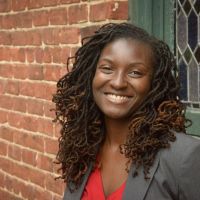
Ebony is the Founder and Principal Consultant at Ebony Walden Consulting (EWC), an urban strategy firm based in Richmond, Virginia. Before founding EWC, Ebony worked in local government and for non-profit organizations dedicated to citywide and neighborhood level revitalization. Currently, Ebony is an adjunct professor at Virginia Commonwealth University where she teaches Diversity, Equity and Inclusion in the City. She holds a Masters in Urban and Environmental Planning from the University of Virginia and a Bachelors in Business Administration from Georgetown University.

